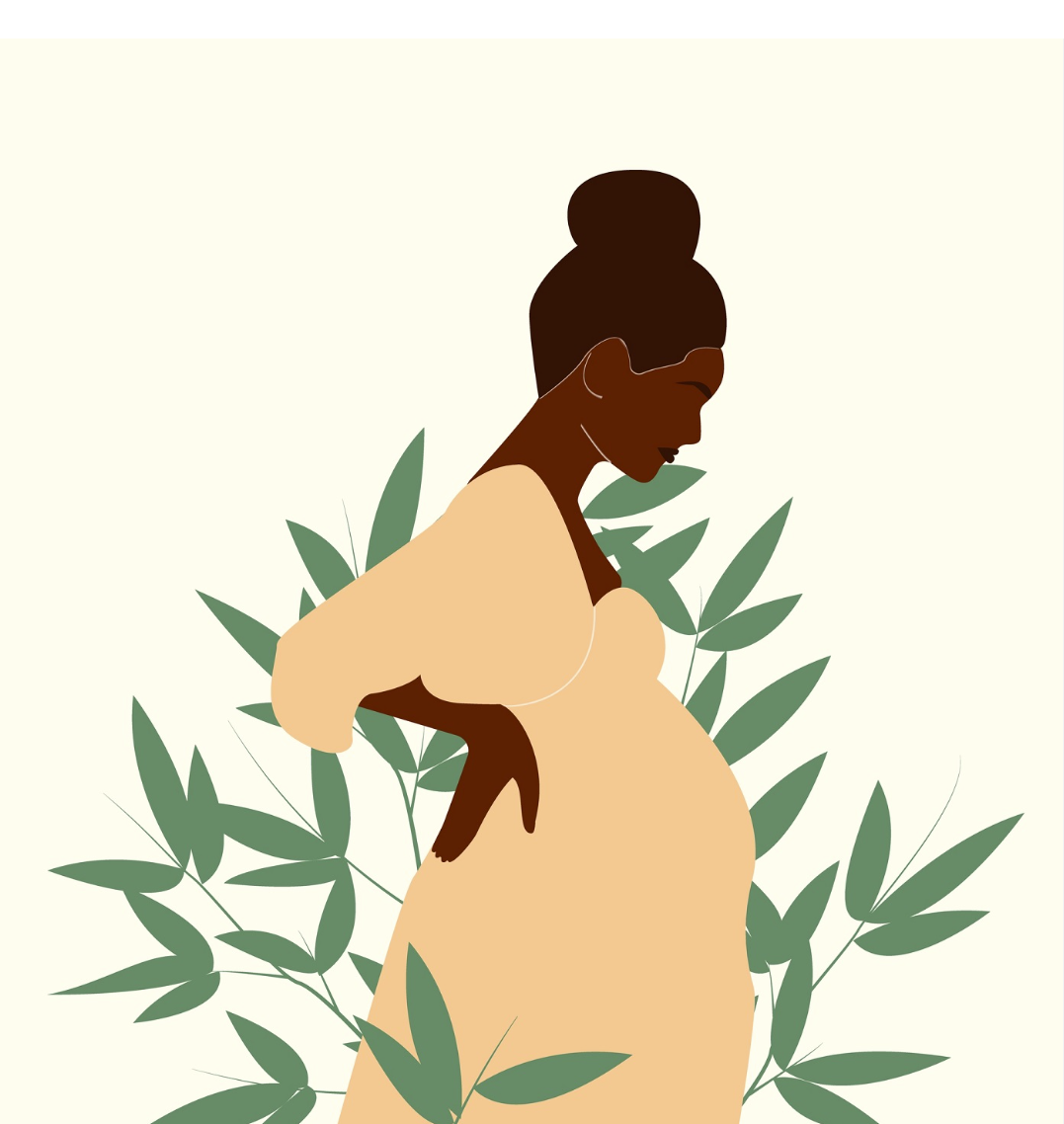The Chronicle continues to showcase the outstanding academic work produced by South students! This year, students of Ms. Ledoux’s Dual Enrollment ENG 102 class were assigned the task of a large scale research assignment on a topic of their choice. Senior Vanessa Mensah, in her well researched final paper, presents an important social topic that demands attention: the high mortality rate of Black women in America.
One day, I was babysitting my niece and nephew, and after a long day of chasing them around, I sighed and cracked my back as I picked up their toys while they napped. My mom giggled at my exhaustion and said, “Wait till you have your own,” and then I thought, “Do I even want to have my own?” This question made me start researching the highs and lows of pregnancy to see if it’s something that I would want to go through later in life. Everything was going smoothly until I stumbled upon this alarming statistic: “Black women are more than three times likely to die during childbirth compared to white women.”
My heart dropped when I saw this, and immediately I thought it couldn’t be true. How could black women have a higher maternal mortality compared to white women when our anatomy is the same? This confusion isn’t the only thing that inspired my research; I decided to research this topic not only for myself but to better help and educate fellow black women around me on how much of a risk we’re at.
As I’ve gone deeper into my research, I’ve realized that the issue of black maternal mortality is a multifaceted issue. Black maternal mortality is a very deep, sensitive topic with many layers; there isn’t just one answer to why black women are more likely to die during childbirth compared to white women. There are so many factors that play a role in this statistic, like history, socioeconomic status, equal access to healthcare, racism, etc. But before we can fully understand modern-day black maternal mortality, let’s take a look into the origins of American Gynecology and how enslaved women played a role in early Gynecology.
J. Marion Sims is considered to be “the father of gynecology” due to his development of a procedure that repairs the vesico-vaginal fistula, which repairs a tear that separates the vagina and the bladder. But Dr. Sims developed this procedure at a vital cost; he developed this after four years of experimenting on enslaved black women without any anesthesia (The Journal of African American History Vol. 92, Issue 4). During that time, it was believed that black women could handle pain better than white women, so they weren’t given anesthesia.
Before the Civil War, plantation owners considered themselves responsible for their female slaves’ maternal health because they knew that the key to more slaves is black enslaved women giving birth more frequently. Plantation owners then turned to physicians to medically manage fertility, childbirth, and address different gynecological issues. Physicians used this opportunity to explore and experiment for the expansion of the medical field. These ulterior motives created a distorted relationship between physicians and their patients because physicians looked out for the best interest of the plantation owners rather than the best interest of their enslaved patients. (The Journal of African American History Vol. 92, Issue 4).
Physicians and plantation owners worked hand in hand and developed a mutualistic relationship; the only one who wasn’t benefiting from this arrangement was enslaved black women. Most physicians at the time had no clinical experience with childbirth; their treatments were often a result of trial and error and were often later disproven. Enslaved black women were basically used as guinea pigs for the development of gynecology because they were not seen as humans with their own rights and were often treated without anesthesia because they were thought to handle pain better than white women, despite having the same anatomy. (The Journal of African American History Vol. 92, Issue 4).
Instead of questioning the brutality of labor from plantation owners as to why enslaved women were miscarrying, physicians instead often accused of deliberately causing miscarriages and decreasing fertility. All in all, since the beginning of American Gynecology, the bodies of black women have been violated, mistreated, and disrespected.
Now that we’ve examined the past, let’s move onto modern-day Gynecology. An angle that I found most interesting to research was the perspective of Black OBGgyn and birth workers. I felt as though their opinions and perspective were vital to this research; I wanted to explore how they felt about this health disparity. Dr. Ebony B. Carter gives her perspective on black maternal mortality from the perspective of a black woman and as a black physician in “A Love Letter to Black birthing people from Black birth workers, midwives, and physicians.” In this letter, Dr. Carter expresses that these concerning rates of black maternal mortality are unfortunately nothing new to physicians, and these disparities stem from white supremacy, classism, sexism, heteropatriarchy, and obstetric racism. Dr. Carter further states that these issues have manifested into “biased clinical interactions, unjust hospital policies, and an inequitable health care system that leads to disparities in maternal morbidity and mortality for Black women.” It’s disheartening to hear that the effects of such unethical practices from the past are still affecting Black women today, and for this information to come from a medical professional is pivotal because it proves the statistic of black women having a higher maternal mortality is unfortunately true.
While the unethical experimentation on enslaved black women has played a huge role in why many Black women may not feel safe within the healthcare system, the Tuskegee syphilis experiments played a huge role in creating a rift between the black community and the healthcare system. The Tuskegee Syphilis experiments were carried out from 1932 to 1972 by the U.S. Public Health Services and the CDC. Doctors collected over 600 black men and told them they had “bad blood”; this was basically the code word for syphilis. In exchange for coming back to participate in the study, those black men were promised free medical treatment, meals at blood testing locations, and burial assurances. Two-thirds of these men had syphilis, and the other one-third had no syphilis and were used as a control group. The group of men that had syphilis had no idea and were purposely kept in the dark, which not only prevented them from seeking appropriate medical attention but the doctors at the time had decided that these men would be their test subjects until they died. An estimated 128 men died during this experiment, and due to these men not being aware of their condition, they unknowingly exposed their loved ones to the disease as well. (Catherine Morris From: Diverse Issues in Higher Education)
Unethical experiments such as this one and many more have caused a lot of black people to not feel safe within the medical field. Since the beginning of American Gynecology, there has been a rift between black women and the healthcare system caused by racism, medical malpractice, and white supremacy, and experiments like the Tuskegee syphilis experiments haven’t made it any better. According to researchers at the University of Michigan, only 75% of black women seek prenatal care while 89% of white women seek prenatal care. According to research done by the Northern New Jersey Maternal Child Heal Consortium, a women and children’s health nonprofit group, many black women don’t visit their physicians because they feel like clinicians regard their lives as risky. Mistakes from the past created an apparent fault in the relationship between black women and the medical community, and this has translated into the high black maternal mortality rate we see today. (Women’s E-News, Dec. 2004)
A common misconception developed during the early development of gynecology is that black women can handle pain better than white women. So often when black women talk to medical professionals about pain they might be feeling during their pregnancy, they’re often disregarded and told to take painkillers instead of putting in work to address an underlying issue. This same thing happened to famous tennis player Serena Williams when giving birth to her first daughter, Olympia. Williams has a history of having blood clots, so when she was having trouble breathing after having a C-section, she knew it must be another pulmonary embolism. But when Williams asked if she could get a CT scan and blood thinner, the nurse suggested that Williams should just take pain medication and that she’s “confused”. Williams had to insist that they give her a CT scan, and when they did, they realized that Williams was right; she had several small blood clots in her lungs. If doctors didn’t listen to Williams, then she would most likely have died of a pulmonary embolism. Occurrences like this are unfortunately too common when black mothers are pregnant or giving birth. (Maya Salam, 2018)
A recent example of black maternal mortality is the case of Krystal Anderson, a former Kansas City Chiefs cheerleader who unfortunately passed away on March 20th, 2024, from cardiac arrest due to sepsis after the stillbirth of her child. Clayton Anderson, Krystal’s husband, expresses that he wishes that more could’ve been done to protect his wife and her pregnancy. “All pregnancy is high risk, especially, more so, when you’re a woman of color, or you’re older, and they should be treated that way from the start,” says Clayton Anderson (Mason Leib, ABC News, 2024) . This statement is not only powerful, but it holds a lot of truth as well; there’s a certain lack of care that’s being given towards black mothers, and unfortunately Krystal Anderson’s case shows us that black maternal mortality is a very timely and current issue that needs to be addressed. Too many families have lost mothers, wives, aunts, and children due to the lack of care and regard black women receive within the healthcare system.
In a study on maternal deaths conducted by the National Institutes of Health (NIH), 46% of black and 33% of maternal deaths were considered potentially preventable. This goes to show that a lot of black maternal deaths potentially could have been prevented.
So now that we’ve gotten to the root of this issue, and how these issues have translated into modern-day healthcare, you might be wondering what can we do to fix this or why does this even matter? This issue matters because the lives of black women are being put at risk due to this health disparity that is rooted in racism. It’s time that modern-day gynecology mends the damaged relationship it has with black women; too many families have lost wives, aunts, mothers, sisters, etc., due to this health disparity. We’ve simply come too far within this country to not fix this issue, and that leads me to my next point.
How can this health disparity be reduced? Dr. Sindhu Srinivas, MD, a maternal-fetal medicine specialist at the University of Pennsylvania, gives insight into what she thinks could help to reduce this disparity. At a policy level, Dr. Srinivas states that interventions like establishing a Maternal Mortality Review Committee, establishing a perinatal quality collaborative, and extending Medicaid for a full year postpartum could help improve outcomes. According to Dr. Ndidiamaka Amutah-Onukagha, PhD, MPH, of the Tufts University Center for Black Maternal Health & Reproductive Justice, incorporating doulas into the process of pregnancy can increase maternal care visits and breastfeeding. One thing that could really help reduce this disparity is for physicians to address any implicit or explicit biases they may have; in order for us to move forward, we have to move on from outdated ideologies.
In conclusion, this research has really opened my eyes to the reality of being a black woman. When I initially discovered this health disparity, I didn’t want it to be true, but after hours of research and even speaking to my own mother, I’ve realized that this disparity rings very true and has been for decades now. But with this information, we all have the knowledge and the resources to make a change in the way black women and women of color are treated within the healthcare system. We can do this by creating more awareness of these issues, researching and supporting policies that take women of color into account. With our efforts, hopefully, we can create a world where fewer families have to lose their loved ones due to this disheartening disparity.
References:
- https://go.gale.com/ps/retrieve.do?tabID=T002&resultListType=RESULT_LIST&searchResultsType=SingleTab&retrievalId=4791da79-e1f1-4968-ae19-28a82f48e892&hitCount=1&searchType=BasicSearchForm¤tPosition=1&docId=GALE%7CA726052733&docType=Article&sort=Relevance&contentSegment=ZHCC&prodId=GPS&pageNum=1&contentSet=GALE%7CA726052733&searchId=R1&userGroupName=mlin_c_scomm&inPS=true
- https://go.gale.com/ps/retrieve.do?tabID=T003&resultListType=RESULT_LIST&searchResultsType=SingleTab&retrievalId=eef18517-b4ae-4027-ac50-8f05ee0de882&hitCount=1&searchType=BasicSearchForm¤tPosition=1&docId=GALE%7CA133375541&docType=Article&sort=Relevance&contentSegment=ZCUK-MOD1&prodId=GPS&pageNum=1&contentSet=GALE%7CA133375541&searchId=R1&userGroupName=mlin_c_scomm&inPS=true
- https://abcnews.go.com/GMA/Wellness/husband-former-kansas-city-chiefs-cheerleader-died-after/story?id=108767055#:~:text=Krystal%20Anderson%20died%20of%20sepsis%20in%20March%20after%20a%20stillbirth.&text=%22She%20was%20my%20world%E2%80%A6,children%2C%22%20said%20Clayton%20Anderson
- https://go.gale.com/ps/retrieve.do?tabID=T003&resultListType=RESULT_LIST&searchResultsType=SingleTab&retrievalId=385c9daa-bdad-435c-8550-31730bc92f32&hitCount=38&searchType=BasicSearchForm¤tPosition=2&docId=GALE%7CA745013894&docType=Article&sort=Relevance&contentSegment=ZNUP&prodId=GPS&pageNum=1&contentSet=GALE%7CA745013894&searchId=R3&userGroupName=mlin_c_scomm&inPS=true
- https://go.gale.com/ps/retrieve.do?tabID=T002&resultListType=RESULT_LIST&searchResultsType=SingleTab&retrievalId=0060d694-fd7b-4cba-906b-0671c6b01075&hitCount=55&searchType=BasicSearchForm¤tPosition=1&docId=GALE%7CA173715365&docType=Book+review&sort=Relevance&contentSegment=ZGPP-MOD1&prodId=GPS&pageNum=1&contentSet=GALE%7CA173715365&searchId=R4&userGroupName=mlin_c_scomm&inPS=true
- https://www.nytimes.com/2018/01/11/sports/tennis/serena-williams-baby-vogue.html
- https://go.gale.com/ps/retrieve.do?tabID=T002&resultListType=RESULT_LIST&searchResultsType=SingleTab&retrievalId=3387e6e7-ecb7-4811-a0a3-64780cb55dbf&hitCount=1&searchType=BasicSearchForm¤tPosition=1&docId=GALE%7CA444712163&docType=Article&sort=Relevance&contentSegment=ZTSI-198501P&prodId=GPS&pageNum=1&contentSet=GALE%7CA444712163&searchId=R5&userGroupName=mlin_c_scomm&inPS=true




